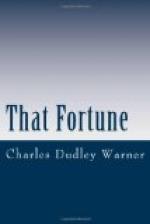The splendor of this function is still remembered. There were, however, features in the glowing descriptions of it which need to be mentioned. It was assumed that it was for a purpose, that it was in fact, if not a proclamation, at least an intimation of a new and brilliant Anglo-Saxon alliance. No one asserted that an engagement existed. But the prominent figures in the spectacle were the English lord and the young and beautiful American heiress. There were portraits of both in half-tone. The full names and titles expectant of Lord Montague were given, a history of the dukedom of Tewkesbury and its ancient glory, with the long line of noble names allied to the young lord, who was a social star of the first magnitude, a great traveler, a sportsman of the stalwart race that has the world for its field. ("Poor little Monte,” said the managing editor as he passed along these embellishments with his approval.)
On the other hand, the proposed alliance was no fall in dignity or family to the English house. The heiress was the direct descendant of the Eschelles, an old French family, distinguished in camp and court in the glorious days of the Grand Monarch.
XXIII
Probably no man ever wrote and published a book, a magazine story, or a bit of verse without an instant decision to repeat the experiment. The inclination once indulged becomes insatiable. It is not altogether the gratified vanity of seeing one’s self in print, for, before printing was, the composers and reciters of romances and songs were driven along the same path of unrest and anxiety, when once they had the least recognition of their individual distinction. The impulse is more subtle than the desire for wealth or the craving for political place. In some cases it is in simple obedience to the longing to create; in others it is a lower ambition for notoriety, for praise.
In any case the experiment of authorship, in however humble, a way, has an analogy to that other tempting occupation of making “investments” in the stock-market: the first trial is certain to lead to another. If the author succeeds in any degree, his spirit rises to another attempt in the hope of a wider recognition. If he fails, that is a reason why he should convince his fellows that the failure was not inherent in himself, but in ill-luck or a misdirection of his powers. And the experiment has another analogy to the noble occupation of levying toll upon the change of values—a first brilliant success is often a misfortune, inducing an overestimate of capacity, while a very moderate success, recognized indeed only as a trial, steadies a man, and sets him upon that serious diligence upon which alone, either in art or business, any solid fortune is built.




